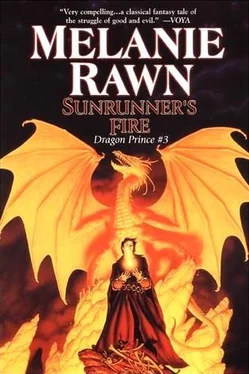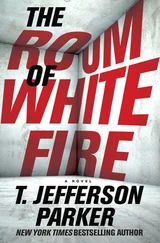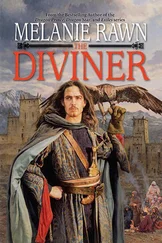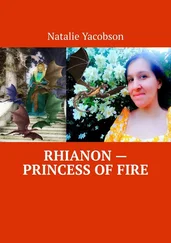Melanie Rawn - Sunrunner's Fire
Здесь есть возможность читать онлайн «Melanie Rawn - Sunrunner's Fire» весь текст электронной книги совершенно бесплатно (целиком полную версию без сокращений). В некоторых случаях можно слушать аудио, скачать через торрент в формате fb2 и присутствует краткое содержание. Жанр: Фэнтези, на английском языке. Описание произведения, (предисловие) а так же отзывы посетителей доступны на портале библиотеки ЛибКат.
- Название:Sunrunner's Fire
- Автор:
- Жанр:
- Год:неизвестен
- ISBN:нет данных
- Рейтинг книги:3 / 5. Голосов: 1
-
Избранное:Добавить в избранное
- Отзывы:
-
Ваша оценка:
- 60
- 1
- 2
- 3
- 4
- 5
Sunrunner's Fire: краткое содержание, описание и аннотация
Предлагаем к чтению аннотацию, описание, краткое содержание или предисловие (зависит от того, что написал сам автор книги «Sunrunner's Fire»). Если вы не нашли необходимую информацию о книге — напишите в комментариях, мы постараемся отыскать её.
Sunrunner's Fire — читать онлайн бесплатно полную книгу (весь текст) целиком
Ниже представлен текст книги, разбитый по страницам. Система сохранения места последней прочитанной страницы, позволяет с удобством читать онлайн бесплатно книгу «Sunrunner's Fire», без необходимости каждый раз заново искать на чём Вы остановились. Поставьте закладку, и сможете в любой момент перейти на страницу, на которой закончили чтение.
Интервал:
Закладка:
Rohan had told him the bare minimum of facts: that during her regency Pandsala had removed several persons she considered detrimental to Pol’s future as High Prince. The disclosure had been brief and bitter. Ostvel had not pursued the matter despite horrified curiosity about what Pandsala had done and how. But he had at last understood why she was a forbidden topic around Rohan and Sioned, and why they had not gone to Castle Crag for her ritual burning.
Roelstra’s daughters, he told himself, shaking his head as he locked his library door and sat down at the huge slate-topped desk. One of a score of keys unlocked yet another coffer of most-secret records. The lesser archives were being sorted by trusted scribes. Treaties, trade agreements, marriage contracts, the everyday effluvia of running a large and powerful princedom; none that held any dangers. But all that was in the locked coffers Ostvel read himself. Roelstra’s daughters, he thought again; the labeled dates told him that within would be Roelstra’s concealed records about Ianthe, Feruche, and Rohan.
And perhaps what he feared to find: record of Pol’s true ancestry.
He flinched when rusted hinges squealed a protest as he raised the lid. At least it had obviously not been opened in years, probably not since Pandsala received the keys he himself now possessed. He wondered what she had felt on reading this parchment giving Feruche to her hated sister, or this copy of a letter from Roelstra congratulating Ianthe on the birth of her first son, Ruval. Ostvel stared at the name, remembering with terrible clarity the first time he had seen it: on Pandsala’s list of murders.
He had decided to investigate the most recent records first after finding the archives, and chose a coffer bearing Pandsala’s seal and the date 719. The top layer had been her private diary, sporadic entries regarding politics and their implications for Princemarch and the Desert; internal difficulties, how she had dealt with them, and what she suspected motivated them; and, dated in the summer of that year, a heartbreaking series of jotted notes regarding Pol.
I am blessed by the Goddess with the presence of the only two I have ever loved. Pol is all I hoped he would be, and more besides. I love him more than I would have loved the flesh of my own flesh. His mother could not love him more. He ought to have been mine! Rohan is as I remember him: as perfect and golden as his son. They both should have been mine. Instead they belong to Sioned. Why does she have everything and I nothing?
But those words had not given him the shock of the other parchments, drawn up as if formal Acts of her Regency. He had found them at the bottom of the coffer, neatly folded, each penned in her elegant script. Sentences of death. And at last he had learned the how of her murders, and the why.
He could see the documents as clearly as if they were spread out before him, could feel again the horror of first reading and realizing what she had done to her own blood on behalf of a boy she did not know was her own blood.
An induced miscarriage for Naydra, depriving her and her lord of an heir for Port Adni, which would become a Kierstian crown holding after Lord Narat’s death. Slow poison laced through the parchment of various letters sent to Cipris, before the latter could marry Halian of Meadowlord and produce a legitimate princely heir of Roelstra’s blood who might one day challenge Pol. A hunting accident to dispose of Rusalka before her marriage could produce an heir. The same reasoning applied to Pavla; the method, the gift of a necklace whose prongs were tipped with a slow poison. Rabia, wedded to Lord Patwin of Catha Heights, had borne three daughters and died in childbed of the third, who survived her—but there had never been a breath of rumor that the death had been anything other than natural. Yet she was on Pandsala’s lethal list, too, the means of her death delineated in bold pen strokes. Hired assassins in Waes had rid Pandsala of Nayati before she, too, could marry and produce offspring. Of Roelstra’s eighteen daughters, the Plague had taken five; Pandsala had eliminated five more; five still lived. Of the other three, Kiele had been executed for the murder of a Sunrunner and Pandsala was dead of sorcery. Ostvel himself had killed Ianthe.
But Pandsala’s crimes had not been limited to her sisters. An arranged accident for Obram of Isel, Saumer’s only son, had left Arlis, grandson of both Saumer and Volog, heir to both princedoms. Thus the island would eventually be united under Sioned’s kinsman. Reading this, Ostvel had thanked the Goddess he had not asked Alasen to help with the archives; her adored elder sister Birani was Obram’s widow.
There were similar cold-blooded horrors to be found in Pandsala’s records, all of them with justifications that were perfectly reasonable by her standards. None of her murders had ever been suspected, and some had been positively brilliant in their cunning. For example, she had marked Tibayan of Lower Pyrme for death because of his intransigence regarding certain issues. He had been one of those rare people to whom a simple bee sting was poisonous. Pandsala’s notes showed that in the summer of 714, she had arranged for a whole swarm of the insects to be set loose in his private chambers. This was her most creative kill, and even through his nausea at her logical reasoning and matter-of-fact death sentences, Ostvel was compelled to admire the woman’s ingenuity.
Success in another murder had not brought the desired result. Ajit of Firon’s death—a seizure of the heart caused by poison, according to Pandsala’s record—had left that land without a prince. But Firon had not gone to Pol, despite his superior blood claim. Ostvel now understood the reason Rohan had given it instead to Prince Lleyn’s younger grandson. Though he had unwittingly profited by Pandsala’s other political executions, on discovering the reason for Ajit’s death Rohan had refused to take the princedom Pandsala wished to give him and Pol.
Pandsala’s final murders, however, had produced exactly her intended result. The deaths of Prince Inoat and his son Jos had left Chale of Ossetia without a direct heir. His niece, Gemma of Syr, married Sioned’s nephew Tilal, and when the old man died they would become Prince and Princess of Ossetia. Pandsala had thought Gemma would wed Tilal’s brother Kostas, heir of Syr, and thus merge the two princedoms; but her major aim had been to bring yet another princedom under the control of Pol’s kinsmen. Through her efforts, Sioned’s kin would rule Ossetia, Syr, and Kierst-Isel; allies would possess Dorval and Firon; Pol himself would hold the Desert and Princemarch. Eight out of thirteen princedoms: not a bad return for a mere eleven murders, Ostvel thought acidly.
Pandsala had had four more deaths in mind. But Kiele had destroyed herself without any assistance. Ostvel wondered if an earlier attempt had failed—which led him to speculate about other murders she might have attempted that were not listed. But whatever her other vices, stupidity had not been among them. Eleven deaths in fifteen years were enough to fulfill most of her ambitions for Pol. More might have attracted suspicion.
It was the last entry that had given him the most worry. Ruval, Marron, and Segev, bastard sons of Princess Ianthe: locations unknown. They must not be allowed to challenge Pol for possession of Princemarch.
Ostvel had stared long and hard at the names, as if ink on parchment could give him sight of their faces. He knew what everyone else knew: all three had different fathers, young lords of surpassing physical beauty; all three had been born at Feruche—Ruval in 700, Marron in 701, Segev in 703; all three were thought long dead. What he and only a few others knew was that they had escaped the destruction of their mother’s castle in 704, carried off by loyal guards on horses he and Sioned and Tobin had ridden to Feruche, stolen from them in the chaos of Fire and panic that night. And he shared the knowledge with even fewer people that they were Pol’s half-brothers. These three, of all persons living, Pandsala would have killed if she could.
Читать дальшеИнтервал:
Закладка:
Похожие книги на «Sunrunner's Fire»
Представляем Вашему вниманию похожие книги на «Sunrunner's Fire» списком для выбора. Мы отобрали схожую по названию и смыслу литературу в надежде предоставить читателям больше вариантов отыскать новые, интересные, ещё непрочитанные произведения.
Обсуждение, отзывы о книге «Sunrunner's Fire» и просто собственные мнения читателей. Оставьте ваши комментарии, напишите, что Вы думаете о произведении, его смысле или главных героях. Укажите что конкретно понравилось, а что нет, и почему Вы так считаете.












